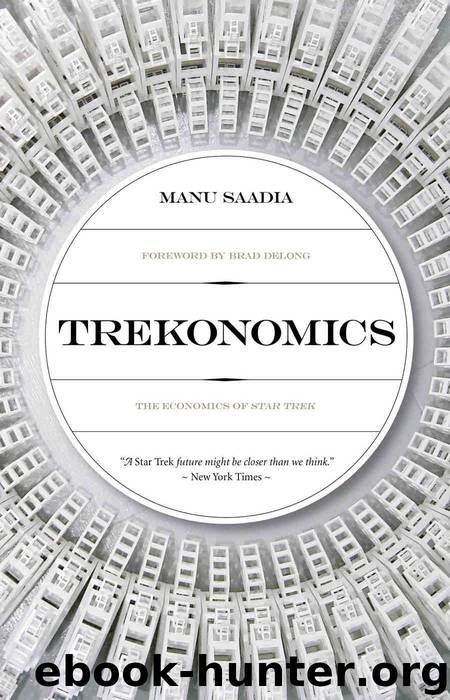Trekonomics by Manu Saadia

Author:Manu Saadia [Saadia, Manu]
Language: eng
Format: epub
Publisher: Pipertext Publishing Co., Inc.
KEEP PARADISE RUNNING SMOOTHLY
Which leads us back to Star Trek and trekonomics. How does trekonomics manage to ward off the dangers of free riding when everything is a public good and there are no financial incentives to speak of?
Qualms and gripes notwithstanding, “Force of Nature” is a uniquely significant effort. It is the only episode in the entire canon where not only the Enterprise but the whole Federation has to wrestle with the central issue of our time: how to get nations, private entities, and individuals to cooperate in order to reduce their use of warp engines (or their greenhouse-gas emissions). And even more pressing: How to prevent some of them from free riding? That is, how to ensure that no one uses faster warp speeds (or emits more carbon dioxide) than all the others, thus causing much more damage to the space-time continuum (or the Earth’s atmosphere) while everybody else behaves carefully.
I mentioned earlier that there seem to be surprisingly few people within the Federation that live high on the hog. The main impetus to free ride—shifting costs present and future onto the community— does not apply because thanks to technology, common-pool resources are close to infinite.
Nevertheless, as a response to free riding, a high-tech cornucopia sounds deeply unsatisfying. Even within the confines of highly speculative fiction, it is too much of a cop-out. It seems to me that technology substitution in and of itself is simply not enough. For one, public goods are not limited to natural resources. They also include the kind of services that only a society can take on collectively, such as education or security—the sphere of public power, if you will. One would think that effective public institutions, vested with the power to enact and enforce responsible resource distribution and usage, are a necessary complement to technological solutions. The problem is that the Federation does not particularly stand out for its strong, centralized, active power structure.
Apart from Starfleet, whose military status is itself ambiguous (I’ll just say that Starfleet’s taste for insignias and spandex pajamas makes it military-curious at best), the Federation relies first and foremost on deliberative democracy. It makes extensive use of seasoned diplomats and negotiators, and never misses an occasion to offer humanitarian assistance to whoever may need it. The Federation is almost all soft power, rather than totalitarian Leviathan. Most of the time, its institutions do not operate through any kind of overt coercion. Elective democracy is the norm. Member planets are self-governing. The president is a figurehead with funky clothes and cheesy hairstyles. And the little we see of the Federation Council, a sort of pomp-and-circumstance version of the Star Wars cantina, does not inspire the kind of awe the Romulan Senate and its Continuing Committee do.
Politics in the Federation is more milquetoast, more liberal administration than heroic statecraft. Elected officials may squabble here and there about marginal issues, but it is hard to imagine them representing conflicting interests or constituents at odds with each other about life-or-death issues.
Download
This site does not store any files on its server. We only index and link to content provided by other sites. Please contact the content providers to delete copyright contents if any and email us, we'll remove relevant links or contents immediately.
International Integration of the Brazilian Economy by Elias C. Grivoyannis(111057)
The Radium Girls by Kate Moore(12028)
Turbulence by E. J. Noyes(8047)
Nudge - Improving Decisions about Health, Wealth, and Happiness by Thaler Sunstein(7706)
The Black Swan by Nassim Nicholas Taleb(7129)
Rich Dad Poor Dad by Robert T. Kiyosaki(6632)
Pioneering Portfolio Management by David F. Swensen(6300)
Man-made Catastrophes and Risk Information Concealment by Dmitry Chernov & Didier Sornette(6019)
Zero to One by Peter Thiel(5801)
Secrecy World by Jake Bernstein(4752)
Millionaire: The Philanderer, Gambler, and Duelist Who Invented Modern Finance by Janet Gleeson(4478)
The Age of Surveillance Capitalism by Shoshana Zuboff(4292)
Skin in the Game by Nassim Nicholas Taleb(4248)
The Money Culture by Michael Lewis(4207)
Bullshit Jobs by David Graeber(4190)
Skin in the Game: Hidden Asymmetries in Daily Life by Nassim Nicholas Taleb(4004)
The Dhandho Investor by Mohnish Pabrai(3764)
The Wisdom of Finance by Mihir Desai(3746)
Blockchain Basics by Daniel Drescher(3581)
